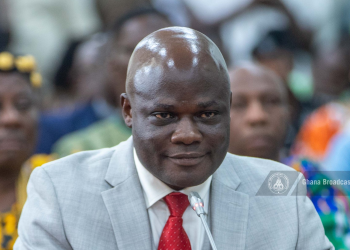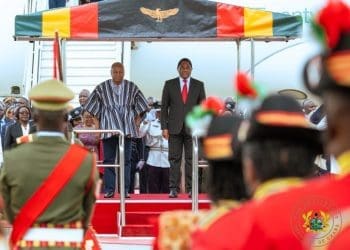For more than two years, the once-thriving Powerland TotalEnergies Service Station at Madina has been silent—its pumps idle, forecourt deserted, and its owner, Mr. Thomas Kofi Classpeter, sinking deeper into debt.
A station turned parking lot
With the station lying idle, office workers in the area have turned it into a daytime parking lot.
From partnership to breakdown
What began as a long-standing partnership with the French multinational has spiralled into a crippling legal and regulatory standoff that has not only shut down his business but is threatening to wipe out his life’s work.
Mr. Classpeter, who worked with TotalEnergies for nine years, had built the Madina station from the ground up before bringing the oil giant on board as a petroleum products supplier.
Severed ties, locked out
But when he decided in July 7, 2023, to sever ties over what he described as unfair practices—including unauthorised deductions from his commissions and fuel deliveries made without request—his attempt to move on was thwarted.
The release letter deadlock
TotalEnergies refused to issue him a release letter, a vital regulatory document required by the National Petroleum Authority (NPA) that allows a dealer to switch suppliers.
Without the release letter, Mr. Classpeter was effectively barred from selling fuel from any other company, leaving his multimillion-cedi investment locked in limbo.
Courtroom battles begin
The standoff escalated into the courts when TotalEnergies, on August 23, 2023, sued at an Accra High Court claiming to be a co-owner of the station.
Court rejects TotalEnergies’ ownership claim
But after two years of legal battle, Justice Patrick Baayeh, presiding, found that TotalEnergies’ contribution of pumps, machines, and branding did not make it a co-owner of the property.
The court also ruled that the installation of CalBank’s ATM at the station without Mr. Classpeter’s consent was wrongful, ordering TotalEnergies to pay him 50% of the rental income collected. Additionally, Classpeter was awarded GH¢50,000 in costs.
Judgment stalled by appeal
The May 23, 2025, judgment should have paved the way for Classpeter to resume business, with the court directing TotalEnergies to issue the release letter within 30 days.
Instead, more than 50 days later, TotalEnergies filed an appeal and a stay of execution, effectively prolonging the closure and trapping Mr. Classpeter in further financial turmoil.
The appeal ensures that the station will remain closed until the case is fully resolved.
Dispute over MoU at the Centre
At the heart of the conflict lies a six-month Memorandum of Understanding (MoU) signed in January 2014, under which the parties agreed to enter a 15-year contract after the expiration of the MoU, but that was never executed.
Justice Baayeh said since the two parties did not sign the formal agreement, there was no binding contract between them beyond the six-month MoU.
Despite this, Mr. Classpeter continued working with TotalEnergies for nine years, relying on the relationship to build his business.
The judge pointed out that the fact that the two parties continued their business relationship for 9 years does not mean that the MoU was given a lease of life by the continued business dealings between the parties.
Debt, rust, and ruin
But when he finally sought independence, the company’s refusal to release him tightened the noose around his operations.
The toll has been devastating. With loan repayments due, salaries unpaid, and equipment rusting at the abandoned station, Mr. Classpeter’s once-profitable venture is now a burden.
This case highlights broader concerns about the power imbalance between local dealers and multinational oil firms.
Regulatory experts warn that unless the NPA enforces compliance with release letter requirements, more Ghanaian entrepreneurs could find themselves in similar predicaments.
Waiting in uncertainty
For now, Mr. Classpeter waits—his debt growing, his business at a standstill, and his future uncertain—all because a partner he once trusted will not let him go.












